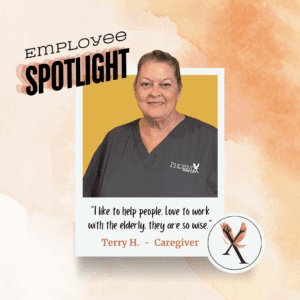Home Health Care and Private Duty Care Can Help Your Loved One with Their New Diagnosis
Dementia is a term that covers a collection of symptoms, including the loss of cognitive abilities, memory, or language skills, to the extent that they interfere with daily activities. There are many causes of dementia, with Alzheimer’s being the most common.
The risk of dementia increases as you age. However, it should not be considered a normal part of aging, as it is a sign of multiple health issues. Older adults are more likely to experience dementia symptoms, but dementia can also begin earlier in life.
These are eight of the most common early signs of dementia – which can be addressed or alleviated with help where your loved one lives, either through home health care services or private duty care.
Disruptive Memory Loss
It is normal as you age to forget things – like upcoming appointments – but remember them later. However, an early sign of dementia is forgetting new information. Forgetting can cause difficulty with day-to-day living.
Disruptive memory loss can include repeatedly asking the same questions. Many people experiencing memory loss may rely on writing themselves reminder notes. Others may simply forget important dates and events altogether.
Your loved one may benefit from someone coordinating care where they live, such as a home health care nurse, or a caregiver attending doctor’s appointments with them or helping them plan their days.
Confusion About Time and Place
Everyone on occasion thinks it’s a different day of the week or misinterprets the passing of time. But people with dementia symptoms can experience difficulty understanding things that are not happening at the moment. They may even be confused as to how they got where they are, misunderstand passing time, or be unsure of the season.
This confusion may lead your loved one to skip medications or take too many medications; get lost in familiar locations; or even be injured as a result. A home health care nurse can help them remember their medications, which can prevent hospital admissions due to dosage errors.
Problem-Solving Challenges
If your loved one begins having difficulty with following a process or understanding number relationships, or they can no longer retrace their steps to locate missing items, they may be experiencing the early onset of dementia.
Difficulty concentrating, following recipes, paying bills, or solving small daily issues can become hard for those with dementia. Although your loved one wants to remain independent, they may benefit from help with tasks of daily living from a dedicated caregiver.
Changes in Judgement
Making smart choices, like responsibly handling finances, bathing every day, or cooking balanced meals, can become difficult for those who are experiencing dementia symptoms. When bad decisions begin negatively affecting their lives, your loved one may need help at home to keep them safe and to protect their assets.
Often home health care agencies or private duty care agencies can help through assigning medical social workers to help your loved one work through their advance directives or durable power of attorney. In this way, important decisions can be made based on your loved one’s wishes, and a power of attorney is authorized to manage their money and property.
Familiar Tasks Become Difficult
Common daily tasks become more difficult for those with dementia. This can include driving to a familiar location, making a grocery list, or remembering how to play a favorite game, according to the Alzheimer’s Association.
Conversely, needing occasional help using the stove or microwave, or asking for assistance with a smart TV may not be a sign of dementia, but rather an expected age-related change.
When the inability to complete normal tasks affects your loved one’s health to the point they need medical care, a home health care agency can send qualified nurses, aides, and therapists, under doctor’s orders, to ensure your loved one is well at home.
Problems with Balance and Depth and Distance Perception
Early dementia symptoms can affect your loved one’s vision. This may be a result of dementia’s effect on the brain and how it processes information.
Vision issues may lead to balance problems or the inability to judge distances – which is particularly dangerous when driving. Difficulty determining color, such as at stop lights, or color contrast, can also affect safe driving. Although vision tends to worsen as one ages due to presbyopia or cataracts, changes to perception are not typical of someone without dementia symptoms.
Trouble Following a Conversation
Even young and healthy people can have trouble finding the right word on occasion, but those suffering from dementia may not be able to hold a conversation, nor call familiar objects by the correct names. For example, Alzheimer’s patients may stop in the middle of a conversation or repeat themselves.
Difficulty following conversations can make it hard for your loved one to understand what is happening at doctor appointments, at the bank, at the auto shop, and on other important errands. And when communication becomes difficult, it is hard for family members to ensure their loved ones are taking care of themselves properly.
Personality or Mood Changes
Because dementia and related conditions affect how the brain processes information, your loved one may undergo personality changes.
Often this includes symptoms like:
- Confusion
- Depression
- Fear or anxiety
- Suspicion
- Easily upset
Unpredictable mood swings can be difficult for family caregivers to handle. That is why many family caregivers schedule private duty care, which provides respite and prevents their burnout.
How Home Health Care Agencies Can Help
If dementia has affected your loved one’s ability to manage their health and has caused frequent hospital admissions, injuries, or medication problems, home health care agencies can provide the support they need to stay as healthy as possible.
Visiting nurses, home health aides, and physical or occupational therapists provide the medical or personal care your loved one needs, while professionally monitoring their condition and reporting back to the physician who ordered the service.
Home health care nurses can help with medication management, wound care, IVs and tube feeding, and much more, while home health aides provide support during bathing, dressing, and other daily hygiene tasks. Occupational and physical therapists help your loved one regain mobility and build skills. These home health care providers visit your loved one wherever they are – in their own home, in a nursing facility, or even in senior housing.
How Private Duty Care Can Help
If your loved one needs companionship and more day-to-day help in their home to maintain independence for as long as possible, they may benefit from a private duty caregiver. Depending on how often your loved one needs assistance, a private duty caregiver may visit as little as two hours a week to round-the-clock.
Private duty caregivers can assist with planning and preparing meals, errands, light housekeeping, bathing, dressing, and transportation to doctor appointments, among many other things. Skilled nursing, which private duty care may sometimes include, can help keep your loved one healthy. Insurance does not cover private duty care.
Supporting Your Loved One with Dementia Through Home Health Care or a Caregiver
To find out which service is right for your loved one suffering from symptoms of dementia, contact a local agency that offers both private duty care and home health care services.




